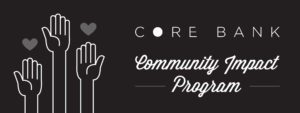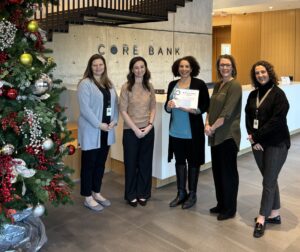
The Set Me Free Project (SMFP) was awarded the Core Bank Community Impact Award for the last quarter of 2023 with a gift of $5,000. They were selected from among several other applicants also very worthy of the award. The Committee’s focus is on where “real impact” can be seen and measured, and The Set Me Free Project marked those boxes.

This grant will allow SMFP to deliver its curriculum to 7,000 individuals in the Omaha metropolitan area from a variety of settings including schools, businesses, and community organizations. SMFP began educating students in a handful of schools in the Omaha area and has grown to reach 64,680 individuals across four midwestern states, having served over 300 different schools/businesses/organizations to date.
SMFP educators are experienced in prevention education, detailed research, and feedback from survivors, experts in the human trafficking field, and SMFP audiences. SMFP educates adults involved in the lives of youth, including teachers, administrators, parents, foster parents, mentors, social services workers, medical staff, youth group leaders, and community members, as well as offers industry-specific training for professionals with information specific to their fields of expertise.
SMFP often visits its entities annually, providing updated educational material and protocol best practices. SMFP presents its curriculum with a trauma-informed lens, keeping in mind those who may have been impacted by sexual violence, child sexual abuse, physical abuse, and/or other risk factors that put youth at greater risk for trafficking. The curriculum was developed with survivors of trafficking and other experts within the field. SMFP also has a Youth Advisory and Action Board comprised of seven high school youth ranging from sophomores to seniors.
People being educated with the curriculum will find it relevant and helpful to their situation and/or discover new prevention and intervention resources available for trafficking survivors or individuals at risk. The curriculum will also help individuals gain a better understanding of human trafficking identification, prevention, and protocol. People who receive the material may change their online behavior based on best practices shared in the training.
This group has been extremely active in reviewing the curriculum, advocating for the organization, and bringing education to their peers. SMFP trained 9,205 individuals in 2022 in Nebraska (52%), Iowa (39%), and South Dakota (3%). 41% of the work in Nebraska was in Omaha.
SMFP travels to schools, churches, businesses, and community organizations throughout the country to build more educated, equipped, and resilient cities. Since its inception, the Human Trafficking Hotline has identified 479 cases of human trafficking in Nebraska, and 1,034 victims were identified in these. Data collected by the Human Trafficking Initiative (HTI) identifies the scope of human trafficking with research revealing that at least 900 individuals purchased sex online each month in Nebraska, likely many more are trafficked through other unknown online or offline avenues.
Unfortunately, these statistics are not representative of the much larger issue at hand. Different sources have attempted to gain a clear picture of the scope of trafficking occurring in their state, however, experiences of threats, force, manipulation, and control make it much more difficult for survivors to escape their traffickers let alone report it to a hotline or law enforcement.
A review of the human trafficking literature exposed that 40% of sex trafficking victims in the U.S. were Black; 63% of labor trafficking victims were Hispanic and 17% were Asian, most of whom were undocumented migrants (U.S. Department of Justice). Most schools, businesses, and other organizations lack the resources to provide this type of prevention education and training to their members. While organizations exist to provide awareness on the issue, assist law enforcement, and provide immediate crisis support to survivors, SMFP fills a unique gap in Nebraska services through prevention education and training.
Listen to the May 2024 podcast with Stephanie Olson, Chief Executive Officer and Founder of The Set Me Free Project.
The Core Bank Community Impact Award is granted to an organization every quarter. Read more about past award winners. The Core Bank Community Impact Award reflects a deeper commitment to improving economic prosperity, especially for under-resourced individuals, families, and small businesses. Core Bank is dedicated to building healthier, more resilient, better connected, and inclusive communities throughout our footprint.